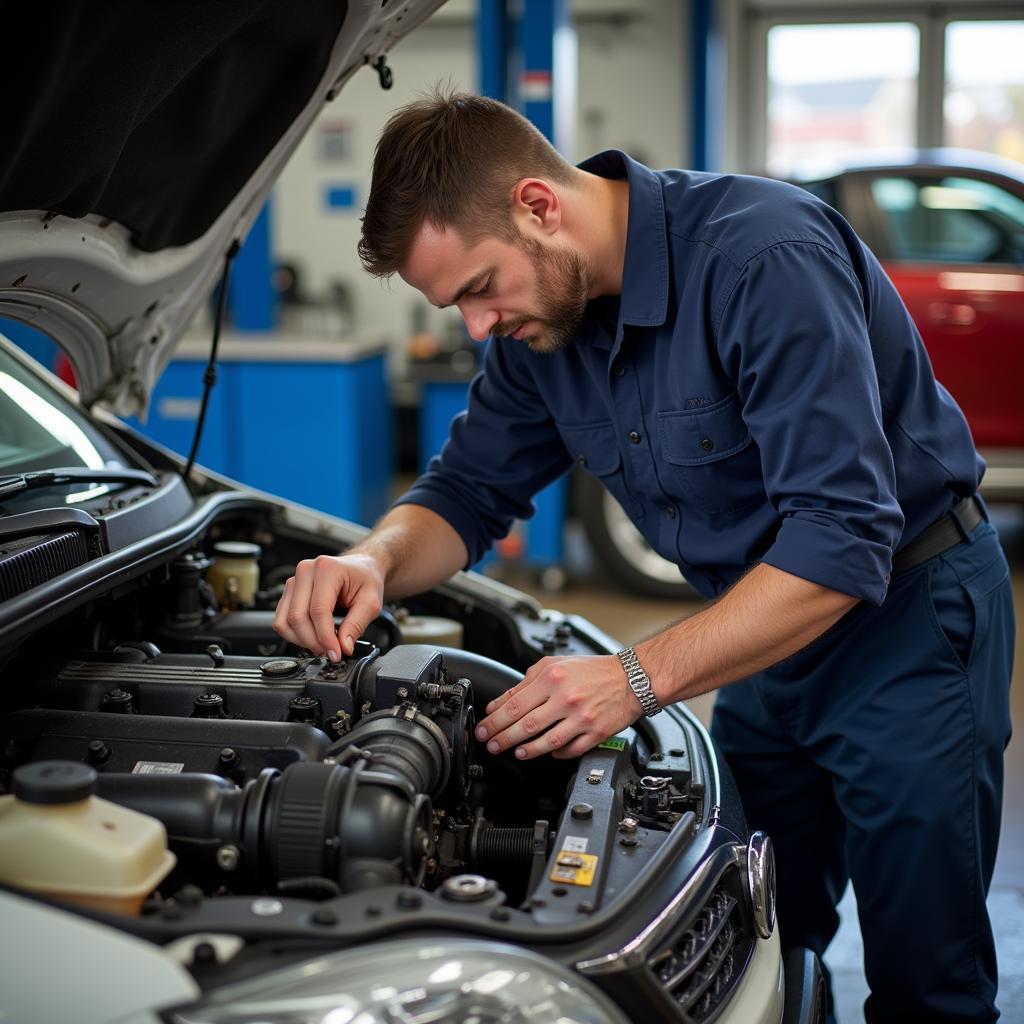What Does Car Servicing Do?
Car servicing. It’s one of those things every car owner knows they need but might not fully understand. So, what exactly does car servicing do for your vehicle? In a nutshell, regular car servicing ensures your car runs smoothly, safely, and efficiently for years to come. It’s about much more than just an oil change—it’s a comprehensive health check for your car.
Unveiling the Mysteries: What Happens During a Car Service?
A car service isn’t a one-size-fits-all deal. The specifics can vary depending on your car’s make, model, age, mileage, and the type of service you choose. However, some common procedures are found in most standard car services:
- Oil and Filter Change: This is the cornerstone of car maintenance. Fresh oil lubricates your engine’s moving parts, reducing friction and wear. The filter traps dirt and debris that can contaminate the oil.
- Fluid Level Checks and Top-ups: Your car relies on various fluids, including coolant, brake fluid, power steering fluid, and transmission fluid, to function correctly. Mechanics check their levels and top them up as needed.
- Tire Inspection and Pressure Adjustment: Properly inflated tires are crucial for safety, fuel efficiency, and tire longevity. Mechanics inspect your tires for wear, damage, and pressure issues.
- Brake Inspection: Your brakes are your car’s most crucial safety feature. Mechanics inspect your brake pads, rotors, and calipers for wear and tear.
- Battery Check: Your battery powers your car’s electrical components. Mechanics check its voltage and overall health, ensuring it’s ready to start your engine.
These are just a few of the many checks performed during a car service. More comprehensive services might include inspections of your car’s suspension, exhaust system, belts, hoses, and more.
The Benefits of Regular Car Servicing: Why It’s Worth It
You might be tempted to skip a car service to save money, especially if your car seems to be running fine. However, regular car servicing offers several substantial benefits:
- Increased Safety: A well-maintained car is a safer car. Regular servicing ensures your brakes, tires, lights, and other safety systems function correctly, reducing the risk of accidents.
- Improved Fuel Efficiency: A well-tuned engine burns fuel more efficiently, saving you money at the pump. Regular servicing helps keep your engine running optimally.
- Extended Vehicle Lifespan: Regular maintenance can help prevent minor issues from escalating into major problems that require costly repairs.
- Higher Resale Value: When it’s time to sell your car, a well-documented service history can increase its resale value.
- Peace of Mind: Knowing your car is in top condition provides invaluable peace of mind. You can hit the road confidently, knowing your vehicle is ready for the journey.
 Mechanic Inspecting Engine
Mechanic Inspecting Engine
“Regular car servicing is not just about fixing what’s broken, it’s about preventing breakdowns in the first place,” says John Smith, a senior mechanic with over 20 years of experience. “Think of it as an investment in your car’s health and your peace of mind.”
How Often Should You Service Your Car?
The frequency of car servicing depends on factors like your car’s make and model, your driving habits, and the manufacturer’s recommendations. However, most manufacturers recommend a full service at least once a year or every 10,000-12,000 miles, whichever comes first.
You can find specific service intervals in your car’s owner’s manual. Some cars also have built-in service reminder systems.
Here are some resources to help you determine the right service schedule for your car:
Should You DIY or Go to a Professional?
Some car maintenance tasks, like checking your tire pressure or topping up your windshield washer fluid, can be easily done at home. However, more complex tasks, like oil changes or brake inspections, are best left to the professionals.
Here’s a helpful resource to guide your decision: Should I Service My Own Car?
Choosing a reputable mechanic ensures your car receives quality service using the correct parts and procedures.
Don’t Neglect Your Car’s Needs
Car servicing is an essential part of car ownership. By understanding what car servicing does and committing to regular maintenance, you can keep your car running smoothly, safely, and efficiently for years to come. Don’t wait for a problem to arise before taking action. Schedule your next service appointment today and enjoy the peace of mind that comes with a well-maintained vehicle.
FAQs about Car Servicing
1. What is included in a basic car service?
A basic car service typically includes an oil and filter change, fluid level checks and top-ups, tire inspection and pressure adjustment, and a visual inspection of brakes, belts, and hoses.
2. How much does a car service cost?
The cost of a car service varies depending on your car’s make and model, the type of service, and your location. However, regular servicing can save you money in the long run by preventing costly repairs.
3. Can I service my own car?
While some basic maintenance tasks can be done at home, it’s generally recommended to have your car serviced by a qualified mechanic, especially for more complex procedures.
4. How do I find a reputable mechanic?
Ask for recommendations from friends, family, or online reviews. Look for mechanics certified by reputable organizations, such as the ASE (National Institute for Automotive Service Excellence).
5. What happens if I don’t service my car regularly?
Neglecting car servicing can lead to reduced safety, decreased fuel efficiency, more frequent breakdowns, and a shorter vehicle lifespan.
Do you have any other questions? For further information, you can explore these related topics:
- Does Preventative Care Services Include Annual Check Ups?
- Do You Have To Have Your Car Serviced by Law?
Need immediate assistance? Contact us via WhatsApp: +1(641)206-8880 or Email: [email protected]. Our dedicated customer support team is available 24/7 to address your queries and provide expert guidance.

